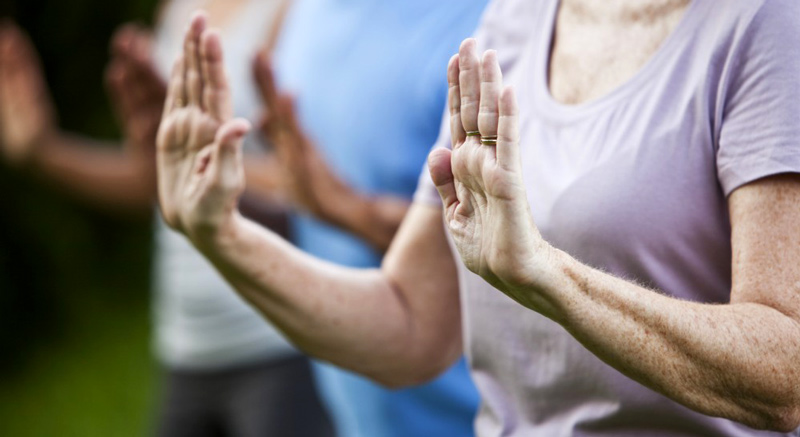Why JinLi Wushu-Tai Chi Actively Supports Victorian Seniors Week

Every year, JinLi Wushu-Tai Chi actively supports Victorian Seniors week to ensure as many senior Australians are exposed to the health benefits of Tai Chi and Qigong as possible.
Tai Chi and Qigong have been practiced in China for centuries but it is only in the last 25 years or so that the West is finally recognising the incredible
health-giving properties of these practices. Here is a short list of the scientifically acknowledged benefits:
1. Reduces blood pressure
2. Relieves the physical effects of stress
3. Promotes deep breathing
4. Improves sleep function
5. Relieves pain associated with muscle atrophy and joint stiffness
6. Reduces bone loss in menopausal women
7. Improves lower body and leg strength
8. Helps with arthritis pain
9. Fights depression and anxiety
10. Accumulates energy by releasing endorphins
11. Enhances mental capacity and concentration
12. Improves balance and stability by strengthening ankles and knees
13. Promotes faster recovery from strokes and heart attacks
14. Improves conditions of Alzheimer’s, Multiple Sclerosis, and Parkinson’s
A comprehensive review of the health benefits of Qigong and Tai Chi was undertaken by Roger Jahnke OMD, Linda Larkey PhD, Carol Rogers, Jennifer Etnier PhD, and Fang Lin (available at the US National Library of Medicine) stating “A compelling body of research emerges when Tai Chi studies and the growing body of Qigong studies are combined. The evidence suggests that a wide range of health benefits accrue in response to these meditative movement forms, some consistently so, and some with limitations in the findings thus far. This review has identified numerous outcomes with varying levels of evidence for the efficacy for Qigong and Tai Chi, including bone health, cardiopulmonary fitness and related biomarkers, physical function, falls prevention and balance, general quality of life and patient reported outcomes, immunity, and psychological factors such as anxiety, depression and self-efficacy. A substantial number RCTs have demonstrated consistent, positive results especially when the studies are designed with limited activity for controls. When both Tai Chi and Qigong are investigated together, as two approaches to a single category of practice, meditative movement, the magnitude of the body of research is quite impressive.”
This review was published in 2010. Since that time, Western scientific interest has grown dramatically with dozens and dozens of research projects being undertaken every year. Harvard Medical School has even set up a specific program within the Osher Research Center devoted to Tai Chi and Mind-Body Research, so we are just scratching the surface of knowing the full extent of Tai Chi and Qigong’s amazing health benefits. In the meantime, anecdotal evidence suggests the results are likely to be immeasurable.
So there has never been a better time to start embracing Tai Chi and Qigong as a gentle, non-invasive, inexpensive way of staying healthy well into
old age. If you are curious, please come to any of JinLi’s classes and find out for yourself why practitioners are living longer, healthier and
happier lives.
Recent Posts
- Qigong: A Guide to Understanding the Many Paths of Energy Cultivation
- The Year of the Wood Snake and Tai Chi/Qigong: A Harmonious Interplay
- An Introduction to the Six Harmonies in Taijiquan
- Tai Chi Lessons from a Broken Piano: Work with What You Have
- Tai Chi and Cage Fighting: Zhang WeiLi, China’s UFC Champion
- Studio 14 - The Launch of a Dream
- It’s The Year of the Wood Dragon – A Great Time to Dream Big
- The 21st WTQA Festival 2023 - My First Wushu Tai Chi Qigong Festival
- Spreading the Word: Presenting the Benefits of Qigong and Tai Chi to Probus Members
- Fortune, Sex, and a Good Death: The Bat in Chinese Symbology
Tags
Archive
- March 2025 (1)
- January 2025 (1)
- November 2024 (1)
- September 2024 (1)
- July 2024 (1)
- January 2024 (2)
- December 2023 (1)
- September 2023 (1)
- June 2023 (2)
- April 2023 (1)
- January 2023 (2)
- November 2022 (1)
- August 2022 (1)
- March 2022 (1)
- January 2022 (2)
- September 2021 (1)
- May 2021 (1)
- March 2021 (1)
- February 2021 (2)
- January 2021 (1)
- December 2020 (1)
- August 2020 (1)
- April 2020 (1)
- January 2020 (1)
- October 2019 (1)
- May 2019 (2)
- April 2019 (1)
- March 2019 (3)
- February 2019 (2)
- January 2019 (3)
- December 2018 (2)
- October 2018 (1)
- July 2018 (1)
- June 2018 (1)
- April 2018 (2)
- February 2018 (1)
- October 2017 (1)
- September 2017 (1)
- April 2017 (2)
- March 2017 (1)
- January 2017 (2)
- December 2016 (2)
- October 2016 (1)
- September 2016 (1)
- August 2016 (1)
- July 2016 (2)
- June 2016 (21)
